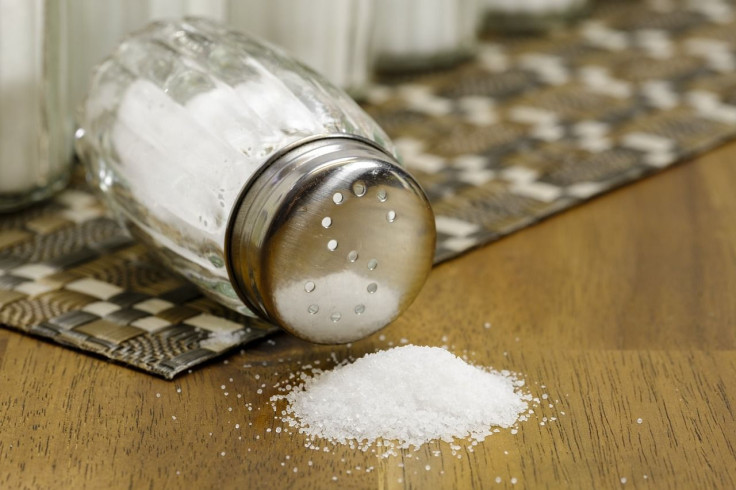Like Adding Salt To Food? The Habit May Increase Premature Death Risk By 28%
KEY POINTS
- Researchers looked at data from over 500,000 individuals
- Those who always added salt to food had reduced life expectancy
- Eating fruits and vegetables may help "attenuate" the adverse relationship
How can the simple act of adding salt to food affect people's health? A new study found that those who "always" add salt to their food had a 28% higher risk of premature death compared to those who "never" or "rarely" did so.
The impact of salt intake on people's health "remains a subject of longstanding debate," noted the researchers of a study published Sunday in the European Heart Journal.
Measuring people's sodium intake is quite difficult to do, the European Society of Cardiology shared in a news release. This is because many foods are already high in salt even before they reach the consumer, while salty foods also tend to be paired with ones that are high in potassium, which is protective against heart and metabolic diseases.
For instance, a taco is rather salty but it also has many vegetables, the researchers noted.
"(T)he highly positive correlation between dietary sodium and potassium intake and their opposite effects on health may be another important reason for the previous inconsistent results relating sodium intake with health outcomes," they wrote.
For their study, the researchers looked specifically at whether the frequency of people's behavior of adding salt to their food is associated with "premature mortality and life expectancy."
"Adding salt to foods at the table is a common eating behavior that is directly related to an individual's long-term preference for salty-tasting foods and habitual salt intake," study lead, Prof. Lu Qi, of Tulane University School of Public Health and Tropical Medicine, said in the news release. "In the Western diet, adding salt at the table accounts for 6-20% of total salt intake and provides a unique way to evaluate the association between habitual sodium intake and the risk of death."
The researchers looked at the data of more than 500,000 participants from the U.K. Biobank. Through a questionnaire, the participants answered if they "never/rarely," "sometimes," "usually," "always" or "prefer not to answer" whether they add salt to their foods.
The study followed participants for an average of nine years and defined premature death as death before 75 years of age.
Indeed, the researchers found that those with a "higher frequency" of adding salt to their foods had "a higher hazard of all-cause premature mortality and lower life expectancy."
Specifically, apart from the 28% higher risk of premature death, always adding salt also lowers life expectancy by 1.5 years for women and 2.28 years in men at age 50 compared to those who never or rarely added salt to their food.
'Substantial Health Benefits'
On the other hand, the researchers also found a possible impact of also eating a lot of fruits and vegetables.
"High intake of vegetable and fruit may attenuate the adverse association of high-sodium intake with mortality," they wrote.
The study has various public health implications, according to the researchers. For instance, the results support the idea of how "even a modest reduction" in people's sodium intake may have "substantial health benefits." That said, they are encouraging further studies on the matter "before making recommendations," said Prof. Qi, as per the news release.
'Sweet Spot' For Salt Still Unclear
In an accompanying editorial, Professor Annika Rosengren of Sahlgrenska Academy, University of Gothenburg, Sweden, noted that the effect of a drastic salt reduction in people is still "controversial," adding that it's also not quite as straightforward.
"Some health advice is straightforward; neither alcohol nor tobacco is necessary for survival, and the harmful effects of these substances are well established. However, with most dietary components, there is an optimal level which applies to salt as well as to many other substances," said Rosengren.
There are also distinctions to be made between recommendations on an individual and the population level. As Rosengren explained, "there is a well-established link between salt consumption and population blood pressure levels."
"So far, what the collective evidence about salt seems to indicate is that healthy people consuming what constitutes normal levels of ordinary salt need not worry too much about their salt intake," she added. "People at high risk with a high salt intake are probably well advised to cut down, and not adding extra salt to already prepared foods is one way of achieving this. However, at the individual level, the optimal salt consumption range, or the 'sweet spot' remains to be determined."
"The obvious and evidence-based strategy with respect to preventing cardiovascular disease in individuals is early detection and treatment of hypertension, including lifestyle modifications, while salt reduction strategies at the societal level will lower population mean blood pressure levels, resulting in fewer people developing hypertension, needing treatment, and becoming sick," Rosengreen said.

© Copyright IBTimes 2024. All rights reserved.






















